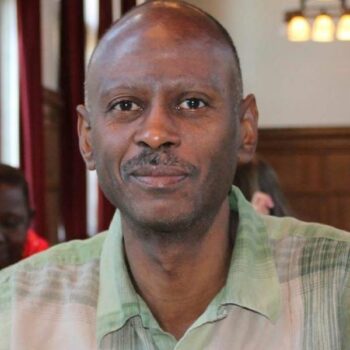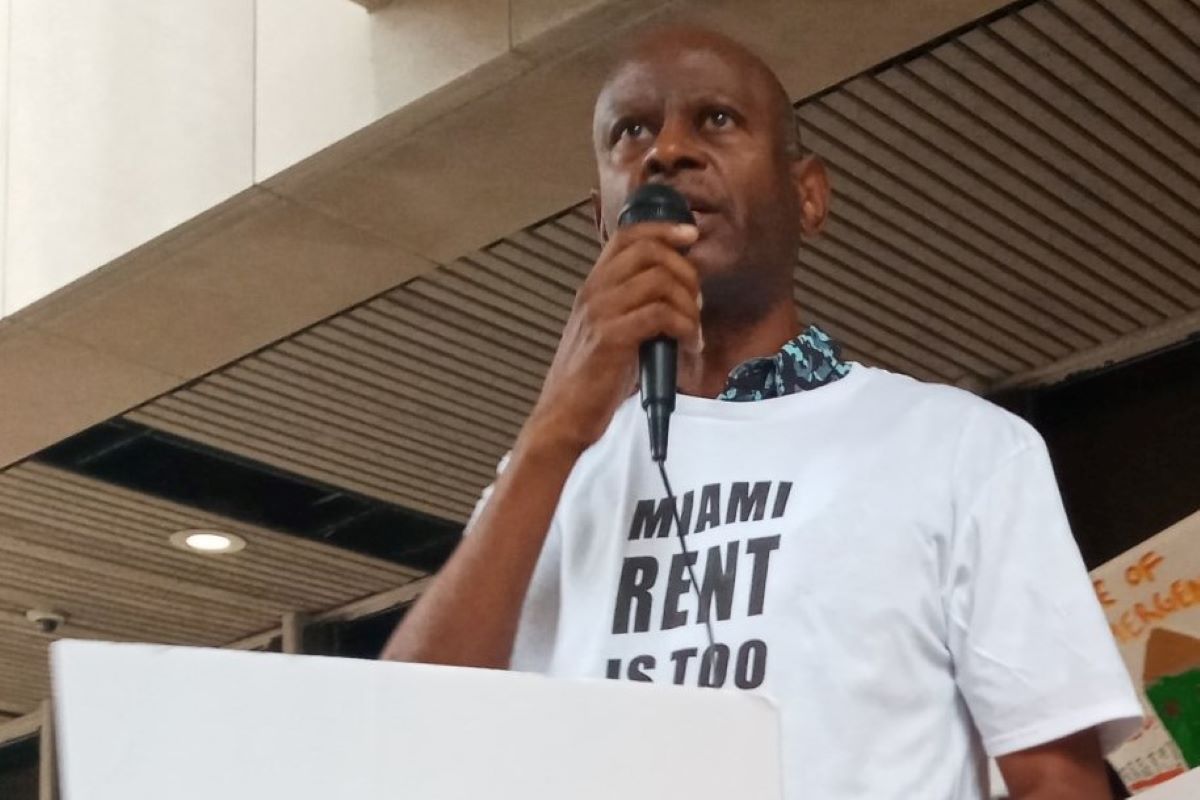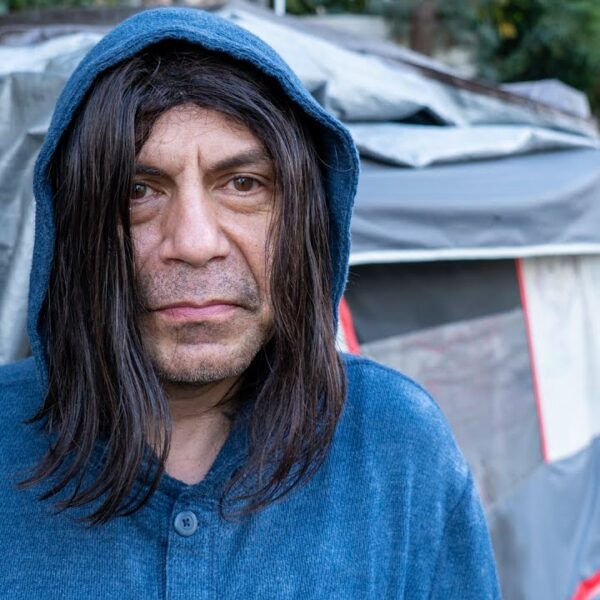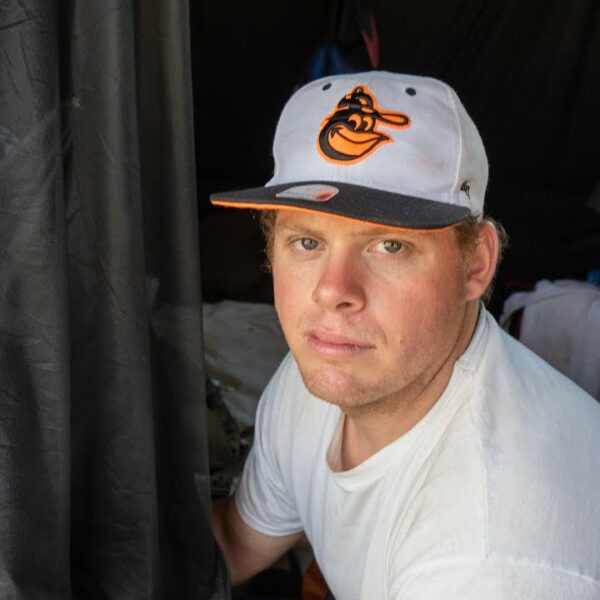An Interview with Democratic Socialism Advocate David Peery
Everyone deserves enough money to support themselves. With capitalism in place, we can never achieve that. Alternatives to capitalism, such as democratic socialism, are frowned upon because we have been taught to associate these alternatives with authoritarian governments.
There truly is no correlation between a more even distribution of wealth and a dystopian society. Quite simply, a more even distribution of wealth is fairer and allows EVERYONE to have the basic human need of housing.
It’s just an obvious concept that equality equals equality. Yet our society continues to distort our view of democratic socialism.
Capitalism Kills
Invisible People writer Kayla Robbins wrote back in December that “capitalism kills nearly 1 million Americans per year,” and we explained earlier this month that “capitalism killed Jordan Neely,” a homeless man who was choked to death for asking for food.
In April, National Homelessness Law Center legal director Eric Tars and Miami Coalition to Advance Racial Equity executive director David Peery called attention to the fact that “homelessness is the capitalist system working as intended.”
Capitalism can’t function without a disenfranchised class. Depriving unhoused and unsheltered people of access to basic housing and services helps the rich to maintain their hoarded wealth. https://t.co/KWYlNWO7Ch
— Housing Not Handcuffs (@HNHCampaign) April 13, 2023
Invisible People recently interviewed Peery to learn more about our nation’s obsession with capitalism and how to fix it. Here is our conversation with him:
Invisible People: Do you think people believe capitalism means that eventually, the poorest people will all make enough money to be able to support themselves?

David Peery, Executive Director of the Miami Coalition to Advance Racial Equity
David Peery: “In my opinion, that is the biggest, most pernicious myth that supports the pillars of capitalism. I guess you call it the Horatio Alger myth – that people can lift themselves up by their bootstraps. That we have a free society and that everybody can succeed if they put their mind to it.”
“I think the overwhelming data shows that when you divide the economy up into fifths of people’s income and assets, the economic quintile that your parents are born into is basically where you’re going to end up. So that kind of reinforces the old saying, ‘Choose your parents wisely.’ Nevertheless, it props up capitalism because everybody believes, or at least a lot of people believe, I’d say the majority believe, that you can make it if you try.”
“And I think it also leads to our cultural bigotry against the poor. That they’re lazy, that they simply haven’t put their mind to it, that they always want free stuff, and that they’re complaining. And that has racial equity undertones to it, too as well. That Black people are basically just lazy or violent or rappers or entertainers. And that they basically just want free stuff and they don’t want to work hard enough.”
IP: What do you mean when you say, ‘homelessness is the capitalist system working as intended?’
DP: “We have our system that funnels wealth from the lower classes up to the elite 1%. And that’s the way that it was designed. That’s the way that Thomas Jefferson, who was an elitist slaveholder, and most of the folks that designed the United States capitalist system intended it to work. Essentially the primary beneficiaries of the economic systems are going to be white males of the elite property owners. The underclasses would work to support them.”
“So even before the founding of our country, we’ve always had a system that has funneled wealth and productivity. The economic production comes from the lower classes and is funneled up to the upper classes, and that’s the way that it’s always been. So when we have the homeless class, it’s manufactured. This is the way the system was intended to work.”
IP: Is democratic socialism the answer?
DP: “I think so. I have to tell you. I was raised in a family dominated by Black communists. My uncle in particular, Nelson Peery, was a leader of a faction of the Communist party. I think Paul Robeson was probably the most prominent of the Black people who latched onto communism as a way out of the economic strangulation and racist oppression of capitalism.”
“I’m somewhat disillusioned – I don’t know if a pure communist society, utopian society is really possible. It’s never happened in the history of the world. There is no communist society. There is no real socialist society either. They’ve all been beleaguered and attacked by capitalist societies and they’ve had to go into either left-wing authoritarianism or make compromises. But I do think that probably the best examples of economies that rely upon community and that are inclusive are the Scandinavian social democracies.”
IP: How would democratic socialism work if it was adopted in the U.S., and why would it work?
DP: “I think, first of all, that certain human rights would be guaranteed. First of all, the right to health care. This country is the only industrialized nation that does not have some type of universal or single-payer health care system. That is fundamental.”
“Health care should not be a commodity sold to the highest bidder, and then if you’re too poor to afford health care, you just get sick and die. I mean, that’s just crazy. That’s just outrageous. So any type of equitable, just society would guarantee the right to health care, would guarantee the right to housing. Those two are inextricably linked. To the extent that you don’t have housing, you’ve got very poor health care and vice versa.”
“In my opinion, the way a social democracy would work — again, I look at the Scandinavian models, where I believe the cultural morays are not so individualistic and not so anti-tax. All members of the community understand that we contribute to the common good. And maybe somebody in Idaho might pay some taxes that directly benefit somebody, say, in Maryland. That’s not considered to be a bad thing. That’s considered to be a good thing because we’re all one united community.”
“Right now, our huge poor class, our huge homeless class, the class of people who go bankrupt because of a medical bill, the people who are struggling, those classes of people all result from the failures of our housing institution, of our health care institution, of our really tattered, inadequate social safety net and of the very limited community support that we have.”
IP: How do you respond to those who believe that we can’t have freedom without capitalism?
DP: “Well, that’s crazy. Freedom to what? Freedom to sleep under a bridge? It depends on how you define ‘freedom.’ If you define freedom as the freedom to exploit people because of your family position, then that’s not the type of freedom that I think most people want.”
“People are delusional about this so-called mythical view of freedom: that we have the freedom to decide our fates. When really, our fates are already decided by the economic class that we’re born into. And, again, that’s the huge, huge, huge myth of capitalism, is to abuse people with this idea that anybody can be anything. We can all be an astronaut. We can all be president. I mean, theoretically, it’s true. We can. But there are huge barriers and huge forces that resist transitioning from one class to another, at least from going up.”
“So this idea of freedom needs to be more well-defined. I view freedom as the freedom to reach your ideal potential with community support.”
“I don’t think you can have individualistic freedom; you must have a community definition of freedom. Because to the extent that you try to push your freedom to exploit other people, you’re denying other people’s freedom.”
“So, we can’t have an individualistic, ‘every man is an island’ type of view of freedom. It has to be a definition of freedom that’s within the context of an inclusive, equitable, and just community that guarantees certain fundamental human rights.”
IP: How do we combat the media and politicians’ perpetuation of the idea that we can’t have freedom without capitalism?
DP: “First of all, obviously education and obviously messaging. Linguists will tell you that certain words trigger certain emotional states. So we need to be very, very careful in terms of the messaging. Freedom and FREE market sound great. Everybody wants freedom. Everybody wants a free market because that sounds to be the ideal state for human beings.”
“But that’s without going beneath the surface and seeing the implications of a so-called ‘free’ market. If you look at the historical trends of a free market, you see they become dominated by monopolies. They become dominated by one or two robber barons, which is what they called them back in the 1890s and early 1900s. So while they push this ideal of a free market, it’s anything but free to everybody except those at the top.”
“But the notion of a free market triggers these emotional states within us, so we tend to like it and push toward it.”
“Let me give you a great example in terms of messaging: rent control. When you think of control, nobody wants control. Everyone wants freedom. So I’ve often argued that we don’t advocate for rent control. We argue for rent stabilization. Because people want to be stable, and that triggers a different emotional state in your mind.”
“So, we need to be very careful about how we market and message our concepts, our ideals because that opens up folks’ minds to learn more about it.”
IP: With humans beginning in hunting and gathering societies where everything was shared and fair, how did we get to capitalism, a system that is so unfair?
DP: “Because of certain gangs. I got my own personal theory about this. It seems like the equitable and just societies were run over by the more ruthless, authoritarian ones. I’m looking at Jared Diamond, who wrote ‘Guns, Germs, and Steel.’ He talked about certain New Zealand societies that were peaceful and just and equitable. And they basically got run over by the ones that were controlled by gangs, the ones who were ruthless, the ones that believed in stealing other people’s stuff.”
“If you go way back in evolution and look at prehuman societies, you look at the chimpanzees versus the bonobos. The bonobos were very peaceful. In fact, they used sex as a means of negotiation. But the chimpanzees were violent. And they would form gangs and alliances that would raid other chimpanzee groups, and they basically took over!”
“They’re the ones that became more successful! So unfortunately, it seems like, if you want to go back prehuman, the more violent, thieving, exploitative societies tend to predominate because the peaceful societies don’t have the defenses against the exploiters.”
“But I don’t think that that’s the way it necessarily has to be moving forward. I think it’s a recipe for disaster if we let the authoritarian, thieving gangs always predominate.”
“I think that we as human beings – and maybe I’m just overly optimistic or maybe naive – can recognize that in order for us to survive, in order for us to deal with issues that are destroying our planet – climate change, pollution, so forth – we have to take a more inclusive, equitable, community-based view.”
“We can’t let the political apparatus dominated by opportunists and self-interested individuals predominate because that will destroy our planet, that will destroy us as a species.”
IP: There’s an urgency to this, with people dying in the street every day. Can you speak to this situation where people don’t act urgently due to their dehumanization of homeless people?
DP: “That’s the whole key, is to dehumanize the homeless and dehumanize the poor in general. Again, this goes back to lifting yourself up by your bootstraps. All of us, I think, have to overcome a cultural bias, if not bigotry, against the poor. We’re raised in this society thinking that people are only poor because they have done certain things that are irresponsible. So, we have to get beyond that bias.”
“That bias then leads to dehumanization, where, at best, we look at the poor with condescension, at worst with contempt. Especially the homeless. Huge, huge, huge stigma surrounding homelessness.”
“In fact, that judgmental condemnation of the homeless, that psychological type of warfare – I actually have a lived experience of homelessness myself – that is one of the more damaging aspects of being homeless. It really affects your self-esteem – you feel it. When people walk past you and don’t see you.”
“In fact, that’s the whole underlying meaning of the website Invisible People. They don’t want to see. Of course, they do physically see you. But they disregard you because they do not feel that you are an equivalent human being.”
“Even the most liberal of us harbor that way down deep, and we have to overcome that. So it’s the dehumanization that is really the most damaging aspect, and it leads to criminalization of homelessness. We believe that people choose to be homeless, and so then we get the police involved in order to force them to make the right choices. And we fail to understand that people are homeless because they lack choices.”
“In fact, they fail to understand that homelessness is deeply rooted not just in intergenerational poverty but it’s deeply rooted in historical racism. And so they don’t want to look at the systemic barriers, the systemic issues that force people into homelessness. They want to blame the victims of poverty and dehumanize them. And that’s a huge barrier.”
“So, I think as homeless advocates, our first duty or first chore is to rehumanize people – exactly what you guys are doing at Invisible People – to show that we are all human beings, all members of the community.”
‘”In fact, I call the homeless our unhoused neighbors. We’re all interconnected. In fact, that’s what COVID showed. When somebody, anybody, has an infectious, dangerous disease, everybody has it.”
IP: Can you speak to capitalism’s role in Jordan Neely’s murder?
DP: “Well, that’s a direct result of the dehumanization of the homeless. That’s a direct result of our capitalist system conditioning us to look at the poor and the homeless as second-class citizens.”
“When we interact with the homeless, we don’t do so as if we’re interacting with somebody who is a member of our community on the same level. We interact with them at best with annoyance, at worst with a desire for us to get away from them or to eliminate them – as if we have to deal with them with violence. It is very equivalent to racism. In fact, the two are inextricably linked.”
“You have this stereotype of the inherently dangerous Black male. You know that guy who was 80 years old who shot and killed this teenager, I believe, who knocked on the wrong door – he exemplifies it in perfect language. He said he looked through his camera, he saw a Black male at his door, and he really thought danger, and so he just started shooting.”
“That’s the same type of attitude, of motivation as (Daniel Penny). They just look at the homeless as inherently dangerous, as people that are not worthy of dignity and respect. So, he acted in his mind the way you’re supposed to act: physically restrain him, choke them because they’re not human beings, snuff the life out of them.”
“I don’t know if he really intended to murder him. But I do know that he applied such deadly force that, in legal terms, it’s called ‘a reckless disregard of life.’ So he should definitely be charged with manslaughter.”
“The Jordan Neely murder is the direct result of our capitalist system’s dehumanization of the poor and homeless. And it’s needed. It’s not an accident. It’s not a coincidence. The capitalist system actively dehumanizes the poor in order to prop itself up. That’s a fundamental pillar of capitalism.”
IP: Do you think that greed also contributes to capitalism in addition to dehumanization? Do you think some people really believe they need a ton of money to be happy?
DP: “Well, of course. You look at some cases like Donald Trump: money and property are associated with self-worth. So, the more cookies, the more gold, the more shiny things that you’ve got makes you worth more than other people.”
“And that’s another destructive element of capitalism: it puts its worth and its value in these artificial items and these commodities that have nothing to do with human relationships, that have nothing to do with binding together a community, have nothing to do with helping to lift your community.”
“So, aside from dehumanization, another horrible aspect of capitalism is the constant draining, the constant transfer of wealth, the constant exploitation – people who are elite just feel a need to keep on making more and more money.”
“Sam Bankman-Fried and Bernie Madoff are extreme examples of that compulsion to accumulate as much as you can, even if it’s fraudulent, even if it’s illegal, because that makes you better, bigger, stronger. That’s your view, your artificial view, your delusional view of your self-worth.”
IP: Do you think there’s some kind of therapy they can go through or some kind of training that can get them not to think that way?
DP: “I do look at it as a mental illness, I really do. Capitalists, I think, suffer from a mental illness. I think they suffer from a divorce from our community, and they look at themselves as unique individuals where it’s a zero-sum game. Either you succeed, and others fail or vice versa.”
“And it’s not a zero-sum game. At the end of the day, when I’m in my rocking chair, I’m going to look at not how much money I’ve made. I’m going to look at the people who are around me. I’m going to look at the people who support me. I’m going to look at the relationships that I’ve forged.”
“So I think it is a mental illness that has divorced individuals from their humanity, from the common bonds of humanity. So I don’t know if there is therapy. That’s kind of interesting.”
IP: Yeah, I was thinking about how there are ways to rethink what makes you happy and that they should take thinking about that more seriously.
DP: “I agree.”
“I think we won’t end homelessness until we reform the systemic issues that compel people to be homeless. Everything else is just going to be Band-Aids on a hemorrhage.”













